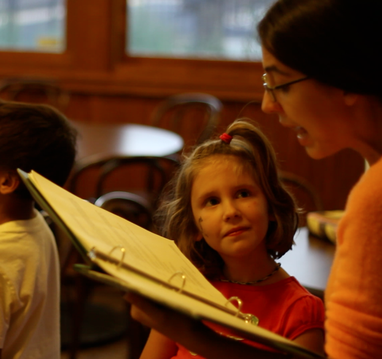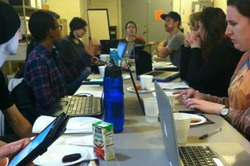Theatre camp is super fun and awesome, right?
You go, you make lots of friends, you work hard learning lines, you study songs and dances, you put on a costume and look terrific, you thank your wonderful audience by taking a bow, and your parents and friends are rightfully proud of all of your hard work.
But.
Before all of that - before we even meet you on the first day of camp, there is so much we have to do to make sure that everything is ready when you arrive.
Over the next few months, I'll pop into our blog here and there to talk a little bit about what goes into producing a play - long before the actors arrive.
You go, you make lots of friends, you work hard learning lines, you study songs and dances, you put on a costume and look terrific, you thank your wonderful audience by taking a bow, and your parents and friends are rightfully proud of all of your hard work.
But.
Before all of that - before we even meet you on the first day of camp, there is so much we have to do to make sure that everything is ready when you arrive.
Over the next few months, I'll pop into our blog here and there to talk a little bit about what goes into producing a play - long before the actors arrive.
Cassandra concentrates on her script, while a student studies her.
So. First things first.
You know those fancy folders you get from us? With the pages inside? With lots and lots of words? You might know by now that that's called a script.
Basically, a script tells the actors what to say and what to do. The words in the script that tell actors what to say are called lines. The words that tell the actors what to do are called stage directions.
So who makes the script? How do they do it?
The person who writes the script is called the playwright.
Wait a minute. If they write the play, then don't you mean play-write?
Nope! "Wright" is an word that we don't use very much anymore, but back when "being a playwright" became a thing, people used it a lot. Wright meant "to work" or "to build" - so when we say playwright, we really mean that that person is building the play, carefully using tools like words and other parts of language to build a story. You can find wright in some other names of jobs, like shipwright (people who build ships) and wheelwright (people who build wheels).
So does the playwright just write the words down and then give them to the actors?
Nope! There are a lot of steps to writing a play. Playwrights and other authors write many different versions of their stories, called drafts, before they show them in public. For me and for our new script, Alice's Adventures in Wonderland, that first public showing happened last Monday at what we call a table read.
Wait, what's a table read?
For us, a table read means that we bring together a bunch of other actors, teachers, and playwrights, to read our script out loud, and tell us what they think about it. It's a really exciting time, and we learn a lot about the new script from being in a room with all of these people with individual ideas and viewpoints!
Before we had our table read, five different drafts of Alice's Adventures in Wonderland were written. And now that it's over, we'll use the ideas people gave us on Monday to write new drafts that will be even better and more fun for kids to perform!
So who makes the script? How do they do it?
The person who writes the script is called the playwright.
Wait a minute. If they write the play, then don't you mean play-write?
Nope! "Wright" is an word that we don't use very much anymore, but back when "being a playwright" became a thing, people used it a lot. Wright meant "to work" or "to build" - so when we say playwright, we really mean that that person is building the play, carefully using tools like words and other parts of language to build a story. You can find wright in some other names of jobs, like shipwright (people who build ships) and wheelwright (people who build wheels).
So does the playwright just write the words down and then give them to the actors?
Nope! There are a lot of steps to writing a play. Playwrights and other authors write many different versions of their stories, called drafts, before they show them in public. For me and for our new script, Alice's Adventures in Wonderland, that first public showing happened last Monday at what we call a table read.
Wait, what's a table read?
For us, a table read means that we bring together a bunch of other actors, teachers, and playwrights, to read our script out loud, and tell us what they think about it. It's a really exciting time, and we learn a lot about the new script from being in a room with all of these people with individual ideas and viewpoints!
Before we had our table read, five different drafts of Alice's Adventures in Wonderland were written. And now that it's over, we'll use the ideas people gave us on Monday to write new drafts that will be even better and more fun for kids to perform!
These actors are working hard to make Alice's Adventures in Wonderland an awesome adventure for you!
Once we make more changes to the script, then we're ready to hand it over to kids who will help us get the words off the page and onto the stage!
Did you know that right now, here at Compass we're getting ready for our Spring Break Script Development Workshop at the Jack Benny Center in Waukegan? What that means for Waukegan, IL students is a week of theatre fun putting together a play (and for us, too!) but it also gives us a chance to make our new script even better by putting it in the hands of the actors it was meant for - kids!
Getting ready for our workshop is a lot of hard work - so I'll sign off for now. But keep a look out over the next few weeks for updates on what we're up to - I'll be sure to keep you in the loop!
- Cathlyn
Did you know that right now, here at Compass we're getting ready for our Spring Break Script Development Workshop at the Jack Benny Center in Waukegan? What that means for Waukegan, IL students is a week of theatre fun putting together a play (and for us, too!) but it also gives us a chance to make our new script even better by putting it in the hands of the actors it was meant for - kids!
Getting ready for our workshop is a lot of hard work - so I'll sign off for now. But keep a look out over the next few weeks for updates on what we're up to - I'll be sure to keep you in the loop!
- Cathlyn




 RSS Feed
RSS Feed